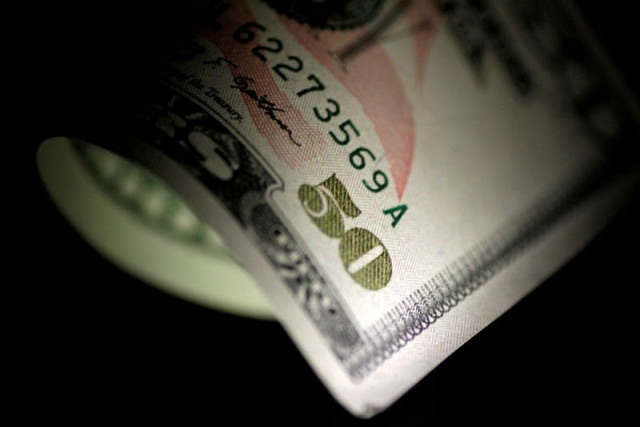Foreigners withdraw $263m from debt securities
SBP says measures in place to reduce risk of outflow, take maximum benefit of investment

A US Dollar note is seen in this Reuters illustration photo.
The Express Tribune tried to understand whether the outflow was the beginning of withdrawal of the entire foreign investment (hot money) from the country and would eventually erode the country’s foreign currency reserves, as highlighted by some economists, or the pullout was normal and there was nothing to be worried about.
State Bank of Pakistan (SBP) Governor Dr Reza Baqir gave the impression at a gathering on Monday (March 2) that the outflow was not expected to take place in a quick and sudden manner.
Besides, the central bank has conducted studies to examine the global trend of investment and divestment by foreign investors in sovereign debt securities. “We have put measures in place to reduce the risk (of outflow) and take maximum benefit of the investment. I just want to assure there is nothing to be worried about,” Baqir said.
Foreigners have invested a total of $3.47 billion and divested $313.93 million since July 2019, according to SBP data.
Talking to The Express Tribune, BMA Capital Executive Director Saad Hashmi said “the outflow is primarily due to the coronavirus emerging as a concern.”
Otherwise, the International Monetary Fund’s (IMF) loan programme is on track, the rupeedollar parity has remained largely stable and interest rate has stayed high in Pakistan. “Nothing has changed on the ground domestically. International concern over the coronavirus has led to this reduction in foreign investment in the domestic sovereign debt securities,” he said.
The Pakistan Stock Exchange (PSX) also saw a spike in foreign selling in February. “The trend (foreign selling at the PSX) indicated that the outflow from debt instruments (T-bills) was due to the coronavirus concern,” he said.
Foreigners may again consider investing more in the debt securities (T-bills and PIBs) in Pakistan if the authorities succeed in containing the coronavirus locally and globally and the increase in new cases slows down. “There is still room for attracting another few billion dollars in T-bills and Pakistan Investment Bonds (PIBs) if the virus is contained,” he said.
The seven to eight-month trend depicted that the investment in debt instruments had been made on a short-term basis (mostly in three-month T-bills), but investors continued to reinvest after every three months.
“This has happened for the first time that some investors have opted to divest their investments instead of reinvesting,” he said.
Since the outbreak of coronavirus in China, infections have spread to around 60 countries. The virus has killed over 3,000 people globally, mostly in China, and infected another 80,000 people.
China, the second largest economy of the world, has gradually started resuming manufacturing activity at its factories. This gives a signal that China has contained the virus and the number of new cases is falling gradually.
“If this trend continues, foreign investment (hot money) will return to Pakistan,” he said.
Arif Habib Limited Head of Research Samiullah Tariq said the outflow was not surprising. “A time comes when investors decide to divest. Investors had continued to invest for over seven to eight months,” he said. “It is almost impossible the entire investment in T-bills and PIBs will vanish in days and weeks,” he said.
“The foreign investment in domestic debt instruments may hit $5 billion mark by June 2020. This may happen along with some of the investors exiting the debt market,” he said.



















COMMENTS
Comments are moderated and generally will be posted if they are on-topic and not abusive.
For more information, please see our Comments FAQ